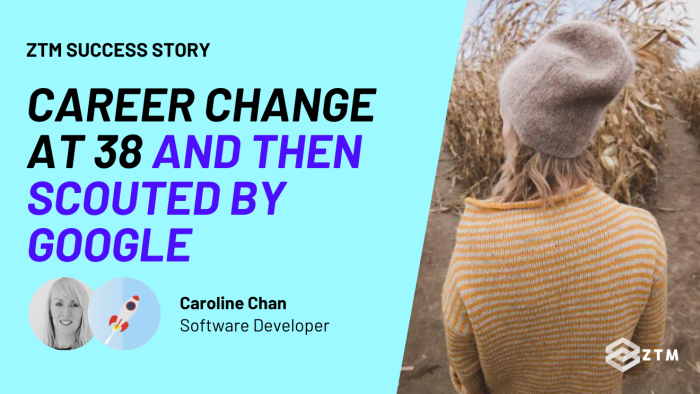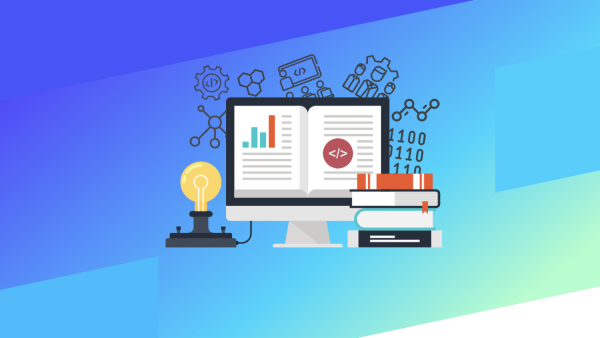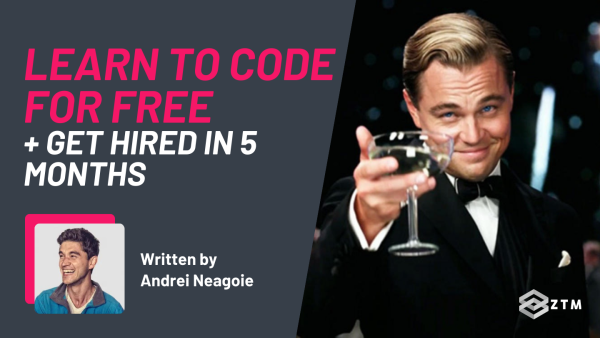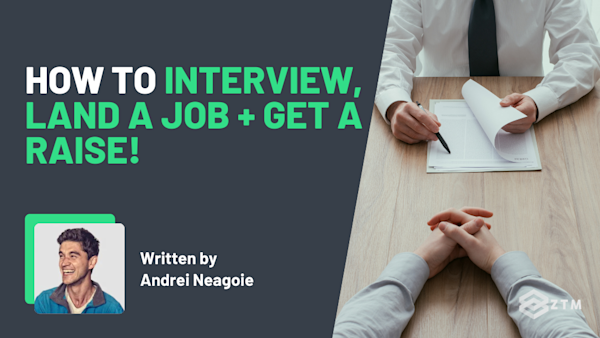Who is this post for?
Anyone who is thinking of changing career 30+ or at any age, particularly those who may be embarking on the Software Development path.
I’ve sectioned off this article with the background of why I chose Software Development, the preparation to the study period, then a summary of each of the six months with key learning points.
There are references to resources/courses throughout and also a list at the end. The core course I completed — The Complete Web Developer: Zero to Mastery is summarised succinctly here, with excellent advice if you’re just getting started.
Why I went for the ‘self-taught’ route:
After hitting the ceiling in my current role after 8 years, I was seeking a career change where I would be continuously challenged. I was already working in tech, alongside developers on the client services/project management side but had never written a line of code.
The idea of learning Software Development originated from an inspiring talk I listened to at an event in London 2016. A former Udacity student who was now a Software Developer at Udacity, passionately talked about how she learned to code in 3 months, and how satisfying it is as a career. I had already started to think about the possibility of further education, and in late 2016 I applied for a Masters in Software Development, aimed at non IT graduates in Northern Ireland. I failed the entry test and soon gave up on this path. Obviously, I thought, ‘my brain just wasn’t wired that way’. (current me: ‘?!’)
Fast forward to late 2017, after exploring various other career opportunities, I discovered an online IT degree with a duration of 6 years part-time, or 4 years full time. Approaching 40 in a few years, I thought it’s now or never to take action! At the very least, I thought back then, I’ll learn more about IT / Software Development to improve how I work with Developers as a Project Manager.
I enrolled in Feb 2018 and was dismayed that with the workload and modules, the online degree was going to take realistically the full 6 year period with my current job. I’d hoped to reduce my hours at work and complete it sooner, but with a new project on the horizon, it wasn’t possible. I remembered that talk from Udacity and revisited the self-taught Software Development route.

I had previously studied for a Business degree part-time while working 70+ hours a week in 2006, so I figured I could do the working & studying combination again, however, this didn’t go to plan. I’d started an Intro to Programming course but with working around 10 hours a day, it was a struggle to find the brain power outside of work to give this, or anything else, enough focus. I also wasn’t sure if I was on the right learning track — there are a vast amount of courses out there! I had to consider that in 2006, I’d held a non-managerial sales job which was less stressful, now I had a senior position balancing many complex projects. Also, studying Business is more subjective then programming!
Although this time gave way to a lot of back and forth on various learning paths, after some short introduction to coding courses and inspiration from other Developers, I was now sure this is what I want to achieve — to become a Software Developer.
This decision was cemented when I read about a local IT student (now Software Developer), Zoe Gadon-Thompson. The talk was titled ‘I don’t know what I’m doing’ and it really resonated with me, that it was ok to be in a position of not knowing and just go for it. Zoe totally transformed her career from working in a call centre and combined studying with being a mum. Total respect. I believe Zoe’s new blog is coming soon so please do follow her on Twitter to be inspired like I was. Thanks Zoe!
The way I see it, if you’re 38 (or any age) and feel too old to change careers, you’re going to be 40 (or plus 2 years) regardless. So why not take action now? Especially with all the free resources out there. If you are not able to study full time, it’s possible to learn something even for half an hour each day, and you’ll still be moving towards your goal.
My new career goal: Secure a job as a Junior Software Developer before summer 2019 (in approx. 1 year).
I decided that, in order to achieve my goal, I would focus on studying full time and gave notice to my employer, to leave August 2018. I had savings but still sold my car, reducing all outgoings down to ‘essential only’. I was going to be bootstrapping all the way!
Being able to study full time is one of the reasons I believe why I could transition in a relatively short timeframe (6 months). I’ve read about others who have been able to transition while working full time or part-time study/work, It will depend of course on your current job, your financial situation and free time available in your personal life.
Preparation:
I’d spent weeks researching online web development courses, especially those aimed at complete beginners. I found a 5-star rated course on Udemy, The Complete Web Developer: Zero to Mastery (ZTM) which was reduced from £199 to £10.99 as an offer. Wondering about how good the course could be, considering the low cost, I researched the reviews, material, and community. Everything looked exactly what I needed to start with, and all for £10.99!
I immediately enjoyed the ZTM instructor Andrei Neagoie’s teaching style, especially as his methods in teaching only modern technologies, aligned with my learning goals. Andrei is also a self-taught developer and is very encouraging. I’d started the course early summer 2018 but soon had to pause and focus on my handover at work and wait until I had more free time. Until then, I tried to stay as active as possible on Twitter to engage with the #100daysofcode community. I was relatively new to Twitter and I loved being able to connect with so many people in a similar situation and learning level to me. You can check out this advice and other tips in another Medium post I published back in December here.
➡ If you get a ‘no’, as I did with the Master’s degree, don’t give up!
➡ Discover the best method of learning for you, everyone is different. Try a few different courses (most have a trial period).
➡ It’s ok to quit something and start something else, it’s your life. The Quit Police do not exist!
➡ There are a lot of carefully marketed courses / Bootcamps, not all are equal. I read this article recently which may help if you are considering a Bootcamp.
Month 1: September 2018:
After leaving my job after a busy notice period and handover, the serious ‘8 hours a day minimum’ study time I had planned never happened. Instead, all the preparation and study schedule went out the window! Although I found the course tutorials and practical exercises/projects fun and interesting, I struggled to maintain concentration for long periods. I also was filled with self-doubt during those early days, especially when I came up against something difficult.
Over the next 6 months, I would learn to be more flexible with a study plan, breaking up study time into smaller periods, mixing up online tutorials with practical exercises & projects, reading articles, working on my portfolio, and connecting with other developers.
Andrei (Instructor of ZTM's Coding Bootcamp) was very encouraging and although he’s great at motivating his students to keep going, there were times when I thought (often), ‘I can’t’ or ‘I’m not smart enough’. I fell into the trap of comparing myself to others on Twitter, who seemed to be miles ahead after a few days on #100daysofcode. I kept remembering that failed test for the Master’s degree, and things like how I hated Maths at school, and how my brain mustn’t work in the ‘right way’. Crazy self-talk!
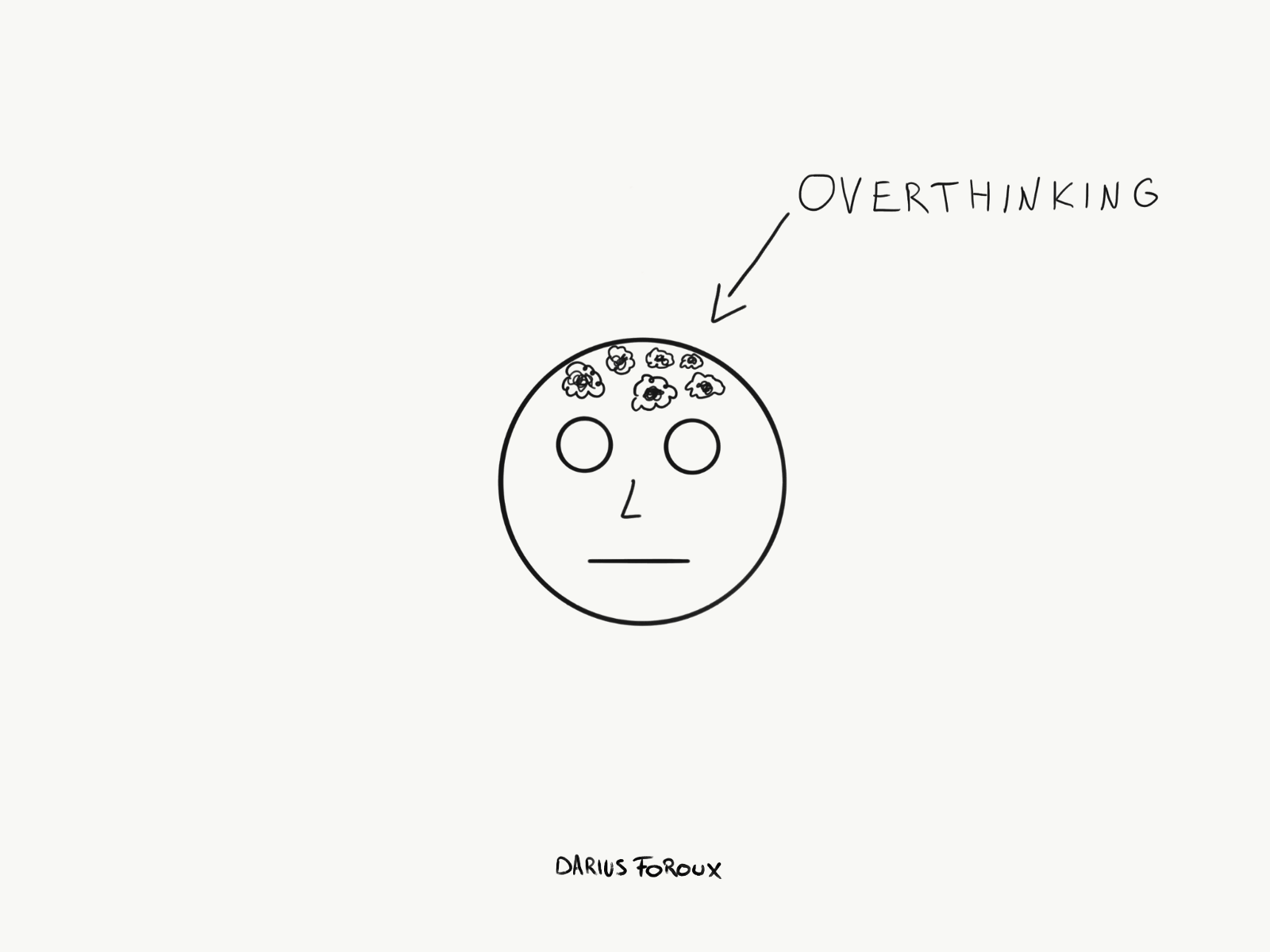
Thankfully, Andrei had also gone through all of that unhelpful thinking before and could encourage me that any person can learn to code, with the right resources, motivation and most importantly, hard work! I also started getting more involved with Discord, the group’s excellent online community, connecting with other student Developers across the world.
During this time, I noticed on Twitter that there was a local (free) Web Development community course happening in my local city, Belfast, through Code First: Girls. This is an amazing organisation who run classes UK wide, to encourage more women to get into the tech industry. I submitted the application just before the deadline and was happy to find out around a week later, I’d been accepted.
➡ Make a study plan but don’t stress out if you don’t stick to it.
➡ Take some time to adjust to studying.
➡ If your course has an online community eg. Discord / Slack, engage with it. At the very least, read what others are asking/doing.
➡ Look out for free courses/workshops in your area, take any opportunities that are available. (especially those that are free!)
“Great things are done by a series of small things brought together”, Vincent Van Gogh
Month 2: October 2018:
Starting the 8-week Code First: Girls Web Development course mid-October, I entered a class with a mix of university students, students on work placement and others working in various industries. I was by far the oldest person in the room at 38 and it was the first time I had to talk about what I was doing to others. I was actually quite nervous to start with but everyone was so encouraging.
Huge shout out to CFG, especially Lydia Quinn who advocated the entire course for non-students, making it possible for women like me to get a place on the Code First: Girls course in Belfast. I’m now a volunteer instructor on this course and I love seeing women from all backgrounds learning to code. You can read Lydia’s excellent Medium post of what it’s all about here).
During this time, I still worked through the ZTM Bootcamp (albeit more slowly). The Code First: Girls Web Development course really propelled me forward not only in terms of knowledge but the confidence that I was on the right track. I thoroughly enjoyed the classes, especially receiving quality advice from the course instructors, who were experienced Software Engineers.
My final website project was called ‘Coffee&Code’ — coding challenges for new coders. I decided to make the group a reality, created a Meetup profile and sourced a venue/sponsorship. A local co-working space kindly provides us with stunning office space and coffees. Shout out to Clockwise Belfast! Within hours of adding the group to Meetup, I received a message from a Computer Science university lecturer asking if he could direct some students to the group, as their beginner’s class was oversubscribed. The member list grew quickly; there were many others in my shoes, from Computer Science students to more mature career changers like myself.
Starting this group is one of the most worthwhile things I’ve ever done. I wanted to create a welcoming space for ‘code newbies’ where it didn’t matter what your level was, you’d be able to participate and learn something. In the early days, I’d been signing up to coding events but backing out of going as I just didn’t think I ‘belonged’ there and would be ‘exposed’ as a big fraud. Hello Imposter Syndrome! I can’t believe I thought this looking back, especially as I have yet to meet any sort of negativity from any other Developer! Since then, I’ve read a lot about Imposter Syndrome, and it’s very common even with Senior Developers. Still, Coffee&Code came out of it, so perhaps it wasn’t such a bad thing after all!
➡ Be kind to yourself, especially if you’ve made some major changes in life to start your new learning path.
➡ You’re out of your comfort zone, so it will feel uncomfortable sometimes!
➡ Ask as many questions as possible, even though you think they sound ‘stupid’.
➡ Connect with others in your community: events / Meetups. Everyone was new to coding at one point!
Month 3: Nov 2018:
Around this time, on Twitter (again, such a great resource!) I heard about a Front-end Development tech conference happening Pixel Pioneers who were looking for volunteers to help with event management. By offering my time to help out, I’d be able to watch the talks for free. As a bootstrapping student, I messaged the organiser immediately! There I listened to some amazing speakers on topics such as CSS for the next billion users, and executing ideas.
I also met more people from my local tech community. One was Paul McBride, a self-taught (now senior) Software Developer. At this point, I didn’t know any other self-taught developers in Northern Ireland. Paul really inspired me, also he introduced me to the Northern Ireland Tech & Design Slack channel, an amazing online community. I lurked mostly in the tech related channels, reading about other’s opinions in the tech industry, tech news, and events. If anyone in Northern Ireland reading this would like to join, please DM me and I’ll connect you.
Still working through the ZTM Bootcamp and attending Code First: Girls every week, I was starting to get into more complex JavaScript, which I really struggled with. I kept going back to JavaScript basics, but I found it all so difficult and I didn’t think I’d ever be able to learn it. I wondered at one point if I’d made a mistake, perhaps I just wasn’t ‘cut out’ for this. I took a couple of days break and then devised a new study plan. Most importantly, I gave myself a break and accepted that it would take time to learn JavaScript. I had to learn a bit of patience too! I used CodeCademy and FreeCodeCamp to get a different perspective. I was confident in what I wanted to achieve, to become a Software Developer, and knew I just had to keep going to get there, even if it was in small steps.
Diving in, I started to create additional projects, to help with JavaScript and also build up my GitHub portfolio. An example was a quote generator inspired by leading women in tech. I sketched out a mock-up of how the page would look. I researched if there was an API for random quotes by women in tech. Finding none, I instead sourced quotes to add to an array. I also followed a tutorial on Medium / Freecodecamp to help guide me through the project. Later I added a Twitter share button which took so long to get working!
➡ Use multiple resources if you’re stuck on one concept.
➡ If you’re really stuck — take a break or move on to something else for a while.
➡ Keep a list of resources — courses/articles/links.
➡ Start building things as soon as possible, apply what you have learned but don’t be surprised if it takes you a lot longer than you expected.
➡ Use Google, especially Stack Overflow to help, but don’t just copy the code, take time to understand what the code is (also a warning, just because it’s on Stack Overflow, it may not be correct!)
“Anyone who has never made a mistake has never tried anything new.”
― Albert Einstein
Month 4: Dec 2018:
After planning a trip to visit friends in London, I noticed a Tech conference for women happening there at the same time: Geek Girls Guide to the Galaxy. I booked a ticket and had just enough time to create a portfolio site, by customising a Bootstrap template. I wanted to add a website to business cards, and network as much as possible.
One talk I listened to, that really stuck with me was by Abadesi Osunsade, on how to negotiate better as a woman. Abadesi stayed on after the talk to answer questions and gave me some excellent advice on creating a good online presence. She is a true force — CEO at Hustle Crew, an excellent initiative helping organisations to improve Diversity, and author of Dream Big. Hustle Hard: The Millennial Woman’s Guide to Success in Tech. I highly recommend this book, especially if you need help with a career path and achieving goals.
I also picked up the momentum with the ZTM web development bootcamp course and started my most complex project yet — a facial recognition app, starting with the front-end in React. You can check this out with some of my other projects here.
I started to explore jobs and what entry-level roles might be out there (although I didn’t feel ready to apply). I signed up to a fantastic platform called CoderList, which connects self-taught people to entry-level opportunities. Any student/new Developers in UK, please check it out! The CEO James Wood is really committed to connecting Developers with quality opportunities. A short time after creating a profile, CoderList contacted me about an opportunity to apply for the 2 year Google Apprenticeship, starting October 2019. Google! Later I would be approached separately by a Google talent scout which I’ll get to soon.
➡ Keep your eye on the end goal, remember ‘why’ you’re doing this when times get tough. Don’t give up!
➡ If you do start applying, keep an eye on your emails, and be as responsive as possible.
Month 5: Jan 2019:
By now, on the ZTM Bootcamp, I’d moved on to learning about back-end technology — servers and databases. I was coming to the end of the course but still, I didn’t feel ‘confident’ in my ability. Something that helped was participating in a coding challenge — a React project, which is now a real product on Product Hunt.
I surprised myself at being able to read a fairly complex codebase and find improvements. I submitted a few pull requests on GitHub which were accepted — I think this was one of the first time, I felt truly ‘I can do this’.
Code First: Girls were looking for volunteers for the next Web Development course intake, and I gladly put myself forward, happy to help other women get a start in learning Software Development.
➡ There is no ‘end’ to learning software development, you only need to know enough to get to the next stage.
➡ Get involved in a group project and collaborate on GitHub as soon as possible. This is fantastic to talk about in interviews, as Git collaboration is a major part of Software Development.
Month 6: Feb 2019:
Continuing on with the rest of the Bootcamp and completing the back-end part of my app, I also continued to improve my portfolio and learn pure JavaScript.
I noticed that Andrei had another course: Data & Algorithms: Mastering the Coding interview which I purchased for £10.99 at the time. I followed the early modules to ensure my portfolio and LinkedIn profile were as good as possible.
I progressed to final stage of Google Apprenticeship and around the same time, was approached by a Google Talent Scout through a LinkedIn message — along the lines of ‘we like the work you are doing with Coffee&Code and Code First: Girls, would you be interested in Software Engineer opportunities at Google?’
I was absolutely thrilled to be approached by GOOGLE!
After much consideration, and various reasons, I decided that life at Google, although would no doubt be amazing, was not right for me at the time. I preferred not to relocate to London, so I politely declined to progress any further but left the door open to connect again in the future.
I also received an offer to join a local Startup as a Junior Developer. This opportunity came solely from networking, at this point I hadn’t been actively applying. It’s worth mentioning that most jobs I’ve had over the past 20 years are from networking. It’s worth getting out there and meeting others, at every opportunity.
I could write a lot more about job hunting and interviews however I’d only be regurgitating others advice. So please check out this interview prep bootcamp course by Andrei Neagoie and this book by Abadesi Osunsade, both really helped a lot with my online profiles.
➡ Have all online profiles looking sharp, LinkedIn, portfolio and GitHub.
➡ Be open to discussing ALL opportunities but:
➡ Before accepting a job, consider who you will be working with and what experience you will get there.
Present times! March 2019:
In the end, I decided to take another offer — to join my previous company in a hybrid part junior Developer, part Development Manager role. As I’d been working there for many years on the client services side, I understand client requirements and the company’s development processes. I’m working mostly on the client-side Front-end, and managing workflow, with some of the best developers I know! I’m also learning Python in addition to strengthening JavaScript, through Treehouse which I can thoroughly recommend. It’s possible on Treehouse to switch learning tracks from one language to another. There are other options, such as structured Tech Degree programmes, I’d really recommend checking their courses out.
At the time of writing, it’s been my second week as a Software Developer and I’m ecstatically happy to be doing something I enjoy every day and be challenged. Am learning a lot but am pleased to say I no longer get so overwhelmed with what I don’t (yet) know. So far, I’ve been making small but positive contributions to the products and team workflow. I’ll continue to learn and grow as a developer, with a combination of self-study, mentorship, tech events, reading and of course, the entire Twitter development community!
Resources / Costs:
Udacity: Intro to Programming: Free
Skillcrush 10 days Bootcamp: Free
The Complete Web Developer: Zero to Mastery: £10.99 at the time (now part of the Zero To Mastery Academy Membership)
Mastering the Coding Interview — Data Structure & Algorithms: £10.99 at the time (now part of the Zero To Mastery Academy Membership)
Unix for OSX (used book from Amazon): £3.50
Harvard CS50 Intro Computer Science: Free
Dream Big. Hustle Hard.: The Millennial Woman’s Guide to Success in Tech: Abadesi Osunsade: £5.56
FreeCodeCamp: Free
Codecademy £25 / month (1 month subscription)
Treehouse: $25 / month (2 months and ongoing)
Grasshopper App: Free
Current total : £94.04
Summary:
I hope this has been useful to anyone at the early stages of learning software development, or who may be thinking of starting. There are so many paths that can be taken, and an abundance of resources out there, there is no single ‘blueprint’ of transitioning to a Software Developer, but if you really want it, I believe it’s possible to get there!
The best advice I can give you is to connect as much as possible with others who may be on the same path and have walked in your shoes. If there are no Meetups close to you, there’s Twitter, plus many online developer communities on Slack and Discord, that may be available with your chosen course.
Whichever learning path you decide to take, it’s good to be aware that you will not become an accomplished Developer through any singular course alone. If you get stuck — check out other resources, and build something. If it’s terrible, it doesn’t matter! You’ll still have learned a lot by applying what you know or at least, have Googled.
Take small steps towards your goal. You may go backwards and sideways, fall over, cry and laugh (sometimes in the same hour!) but you will get there and it is worth it! My happiest moments have been working through something difficult, then getting to ‘It’s working’ — best feeling ever!
“A ship in port is safe. But that’s not what ships are built for”, Grace Hopper.
By the way, you can also check out all the ZTM courses available here.
